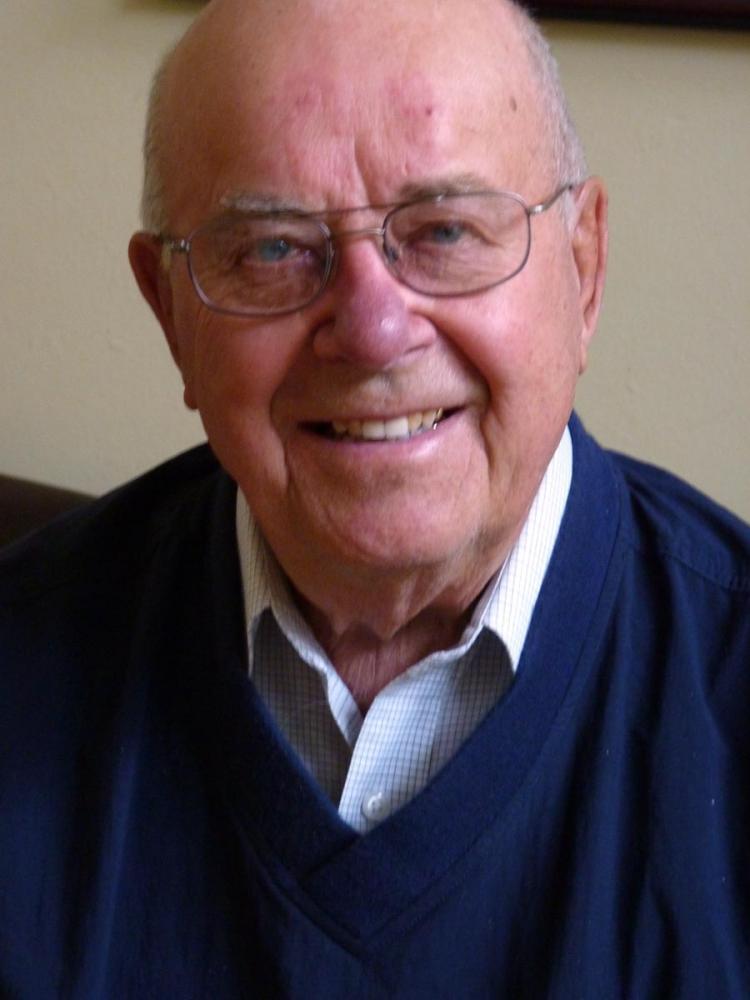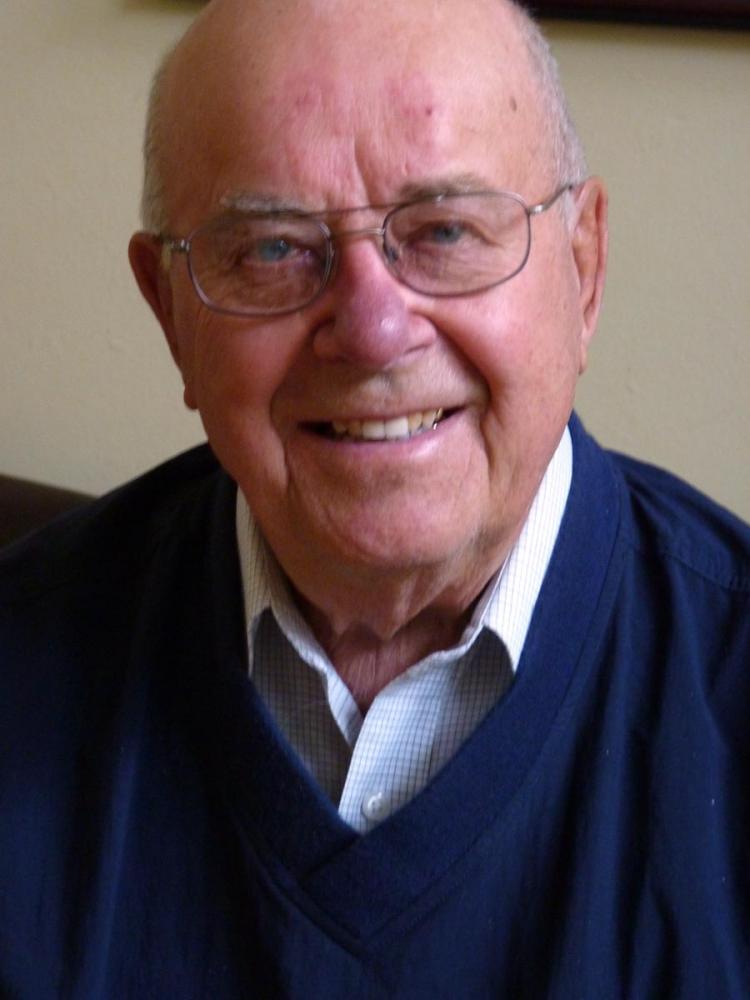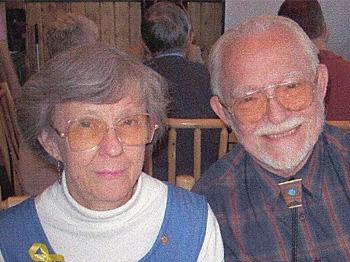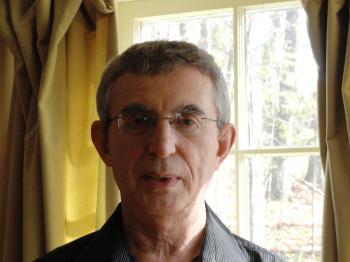Darwin and Dwayne are twins born to second-generation Norwegians at the Home Farm in Aberdeen, S.D. Darwin still lives at the farm bought in 1920 by his father. His childhood on the farm brings him memories that make him sparkle as he tells them. The twins made their own toys out of shingles and wood.
He says, “We had three pets—a pet sheep, a pet pig, and a pet goat. The goat pulled us on a wagon that father made.
“Our German shepherd dog, Rex, would bring the pet sheep home. As a pup, Rex followed us when we went to bring our cattle home. Later, if we just said, Rex, go get the cattle, he would go and round up the cattle and bring them back on his own. We did not know how to train him. He just did it.
“I told my father that one of our friends at school had a kite. He showed us how to build a huge box kite that flew and almost lifted us off the ground.
“During the Great Depression, we had to sit in class with a washcloth over our noses to keep from inhaling the dust.
“During the Depression, grasshoppers would approach like a black cloud darkening the sky; they made a noise with their wings. They were green as grass. They ate everything and our vegetables. We children hated grasshoppers. We would catch their fat bodies and pull their legs off. We never felt sorry for them.
“As a family we lacked nothing. We grew our own food, and every Saturday we went to the market with eggs and cream, and from what we got as payment, we paid for what else we needed from the market.
“We were happy. From 1933 to ’36, we had no rain. The very first time we experienced rain, we ran out in our bare feet to splash in the mud.”
In 1943–1944, after Darwin graduated from high school during World War II, he went to Washington to work at a defense plant. In the spring, he was happy to be back at the Home Farm.
I asked, “What is the difference from during World War II and now?”
He says, “More people, more things. During the war things were scarce. We were rationed, but we got by; wages were $3.50 an hour at the defense plant. Farm workers earned $1.50 an hour.
“Dwayne entered the army. I got to stay back on an agricultural deferment.
Around that time, I met and married Evelyn. Life changes everything. Evelyn started working in a hospital as a nurse’s aide.
‘My grandparents were pioneers from Norway; they struggled during the Depression. We enjoyed going to visit them, 20 miles away. We would get into the car to visit Grandpa and Grandma.
“In 1985, when my youngest (Karryn) was an exchange student in Germany, I went to visit her and then my son Brent, and I went to meet relatives in Norway. We went for a day, but they kept us for a week. I saw the birthplace of my grandpa and grandma.
“The most exciting experience came when I worked at the Lutheran Bible Camp in the Black Hills near Mount Rushmore and the Crazy Horse Monument.
“The Lutheran Bible Camp changed my life. Till then, I had been in business, working my way as an employee to become the owner of a gas station, and selling insurance. But the Bible Camp years were the best seven years of my life (1966–1974).
“The camp was structured around the Bible. It made me more aware of people’s feelings in a way that I wasn’t before, and I became part of the camp. People who came there were changed by their experience. A father came and thanked me, saying, ‘Thank you for changing my son from the one I sent here.’
“The weather was great—more moderate summers, milder winters, very aesthetic place. It was heavily forested with evergreen Ponderosa pines.
“Of all the places I have been to, the strangest was San Francisco. It was an eye-opener for me. Walking down Haight-Ashbury, my mouth was hanging open. But there was beauty, too, in San Francisco at the Golden Gate Park.
“My grandparents and parents accepted everybody. They were never judgmental. As pioneers, they started and helped build their church. It was a dedicated center of their lives.”
He says, “We had three pets—a pet sheep, a pet pig, and a pet goat. The goat pulled us on a wagon that father made.
“Our German shepherd dog, Rex, would bring the pet sheep home. As a pup, Rex followed us when we went to bring our cattle home. Later, if we just said, Rex, go get the cattle, he would go and round up the cattle and bring them back on his own. We did not know how to train him. He just did it.
“I told my father that one of our friends at school had a kite. He showed us how to build a huge box kite that flew and almost lifted us off the ground.
“During the Great Depression, we had to sit in class with a washcloth over our noses to keep from inhaling the dust.
“During the Depression, grasshoppers would approach like a black cloud darkening the sky; they made a noise with their wings. They were green as grass. They ate everything and our vegetables. We children hated grasshoppers. We would catch their fat bodies and pull their legs off. We never felt sorry for them.
“As a family we lacked nothing. We grew our own food, and every Saturday we went to the market with eggs and cream, and from what we got as payment, we paid for what else we needed from the market.
“We were happy. From 1933 to ’36, we had no rain. The very first time we experienced rain, we ran out in our bare feet to splash in the mud.”
In 1943–1944, after Darwin graduated from high school during World War II, he went to Washington to work at a defense plant. In the spring, he was happy to be back at the Home Farm.
I asked, “What is the difference from during World War II and now?”
He says, “More people, more things. During the war things were scarce. We were rationed, but we got by; wages were $3.50 an hour at the defense plant. Farm workers earned $1.50 an hour.
“Dwayne entered the army. I got to stay back on an agricultural deferment.
Around that time, I met and married Evelyn. Life changes everything. Evelyn started working in a hospital as a nurse’s aide.
‘My grandparents were pioneers from Norway; they struggled during the Depression. We enjoyed going to visit them, 20 miles away. We would get into the car to visit Grandpa and Grandma.
“In 1985, when my youngest (Karryn) was an exchange student in Germany, I went to visit her and then my son Brent, and I went to meet relatives in Norway. We went for a day, but they kept us for a week. I saw the birthplace of my grandpa and grandma.
“The most exciting experience came when I worked at the Lutheran Bible Camp in the Black Hills near Mount Rushmore and the Crazy Horse Monument.
“The Lutheran Bible Camp changed my life. Till then, I had been in business, working my way as an employee to become the owner of a gas station, and selling insurance. But the Bible Camp years were the best seven years of my life (1966–1974).
“The camp was structured around the Bible. It made me more aware of people’s feelings in a way that I wasn’t before, and I became part of the camp. People who came there were changed by their experience. A father came and thanked me, saying, ‘Thank you for changing my son from the one I sent here.’
“The weather was great—more moderate summers, milder winters, very aesthetic place. It was heavily forested with evergreen Ponderosa pines.
“Of all the places I have been to, the strangest was San Francisco. It was an eye-opener for me. Walking down Haight-Ashbury, my mouth was hanging open. But there was beauty, too, in San Francisco at the Golden Gate Park.
“My grandparents and parents accepted everybody. They were never judgmental. As pioneers, they started and helped build their church. It was a dedicated center of their lives.”







